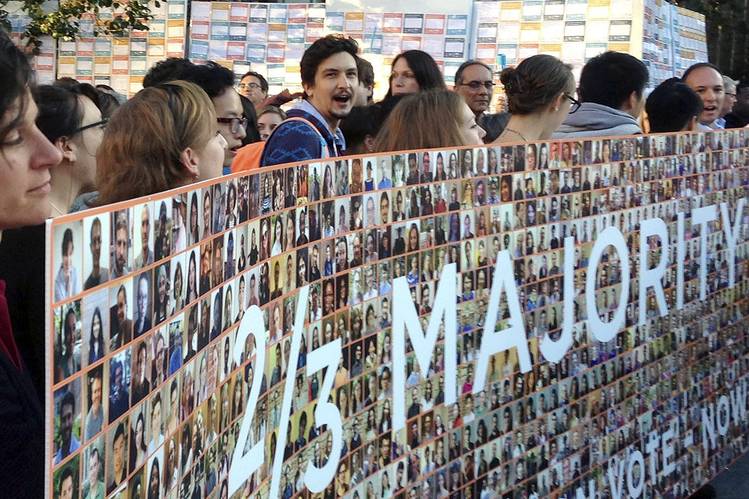
The Graduate Employees and Students Organization, a group of student teachers and researchers, has been fighting for collective bargaining rights for over a decade. In 2015, GESO delivered a petition bearing the names and faces of hundreds of Yale University graduate student employees during a protest in New Haven, Connecticut. (Ryan Flynn/Associated Press)
Graduate students at private universities have long sought a right held by their peers at many public universities: the right to unionize.
Now they can.
In a 3-1 decision issued Tuesday, the National Labor Relations Board ruled that teaching and research assistants at Columbia University are in fact employees with collective bargaining rights.
The decision reverses a previous ruling under the Bush Administration that denied union rights to graduate students at Brown University, and marks a milestone for graduate students fighting to unionize.
The Harvard Graduate Students Union-UAW, which began efforts to unionize back in April 2015, is celebrating today’s decision.
“We spent the last year organizing our union in anticipation of this moment. We are joining a national movement of graduate workers demanding a voice in our working conditions” said James Mitchell, a graduate student in the Physics department at Harvard. “We provide quality teaching and research for the University. When we have a democratic voice at work, we know it will lead to better conditions for graduate workers, which will result in better learning conditions for our students.”
Administrators, including Harvard president Drew Faust, have called research and teaching essential to graduate learning and said students are not employees.
Some economists say higher pay and benefits for grad students will drive up tuition for undergraduates.
"The reality is that if the universities have to pay the graduate students more, then college is gonna get more expensive," said Sandy Baum, a senior fellow at the Urban Institute. "One reason we rely on these people is because they are cheaper."










